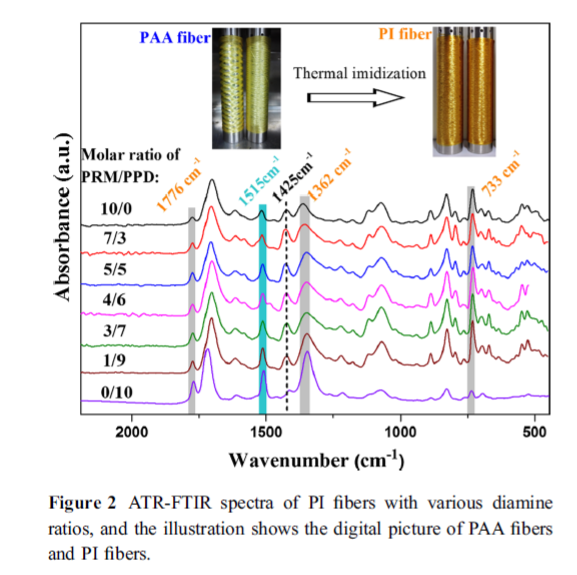High-performance polyimide fibers derived from wholly rigid-rod monomers. Feng Gan, Jie Dong, Dianbo Zhang, Wenjun Tan, Xin Zhao. Journal of Materials Science, 2017, 53: 5477-5489.

ABSTRACT: Insufficient mechanical properties are one of the major obstacles for the wide application of polyimide (PI) fibers, especially utilized as reinforcement in structural composites. In this work, the copolymerization of two rigid-rod diamines, 2,5-bis(4-aminophenyl)-pyrimidine (PRM) and p-phenylenediamine (PPD), with the 3,30,4,40-biphenyltetracarboxylic dianhydride (BPDA) was developed to fabricate PI fibers with high strength and high modulus. The effects of chemical structure (diamine molar ratio) on the molecular packing behavior, micromorphology as well as properties of the resulting co-PI fibers have been investigated in detail. Wide-angle X-ray diffraction spectra showed that co-PI fibers exhibited higher oriented structures with lower lateral packing order degrees in relative to both homo-BPDA/PRM and homo-BPDA/PPD PI fibers, and the Hermans’ orientation degrees reached 0.97 for the two samples with PRM/PPD molar ratio of 5/5 and 4/6. Small-angle X-ray scattering (2D SAXS) patterns indicated that the co-PI fiber with the PRM molar content of 50% showed the densest inner structure. Accordingly, this co-PI fiber presented a higher mechanical performance (tensile strength of 3.11 GPa and modulus of 144.2 GPa) as compared to those PI fibers reported previously. Meanwhile, these wholly rigid-rod PI fibers exhibited excellent thermal stabilities with the 5 and 10% weight loss temperatures ranging from 548 to 565 ℃and from 572 to 589 ℃, respectively. The prominent comprehensive properties make these PI fibers strong candidates for the future fiber-reinforced polymer composites.